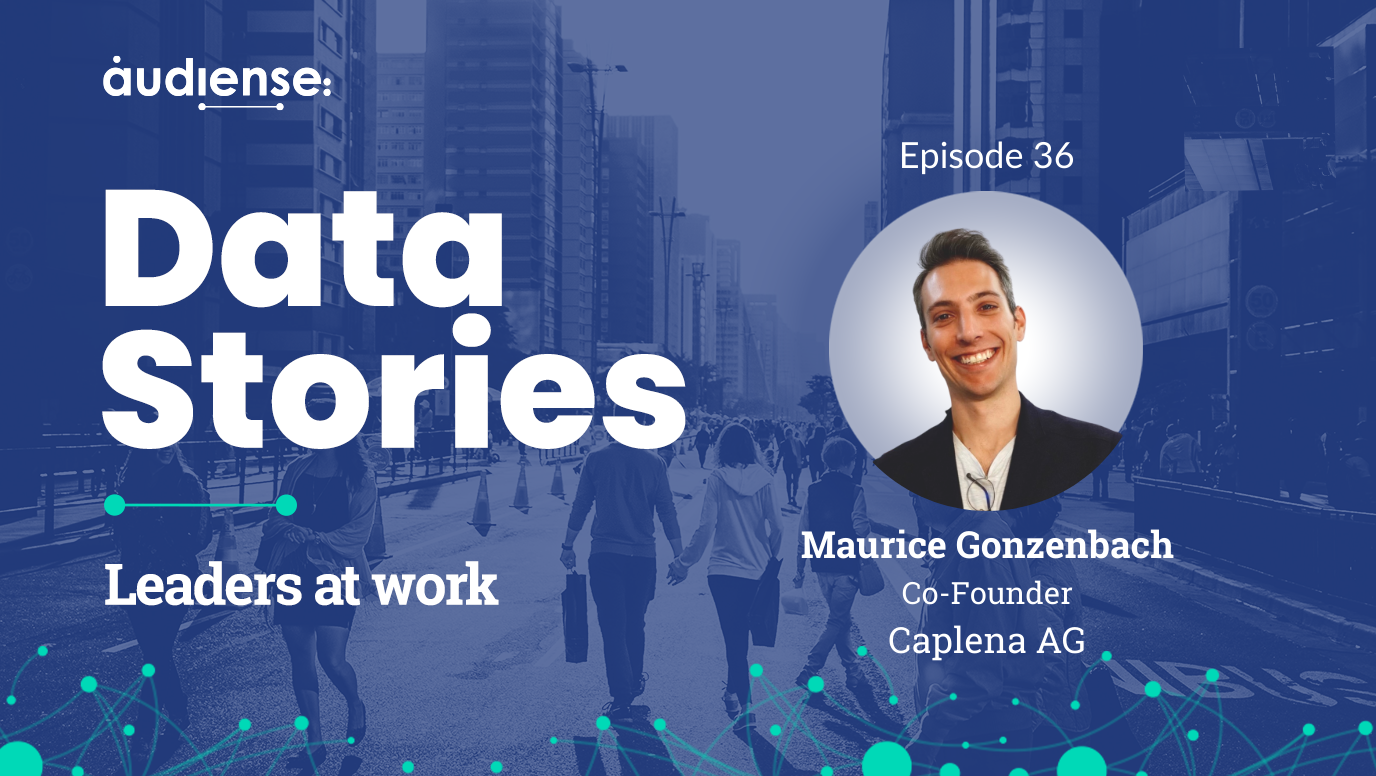[PODCAST] Les problèmes sont souvent la source première des idées
Histoires de données : Les leaders au travail est un podcast hebdomadaire proposé par Audiense. Animé par Rahul Jerome, fondateur de insight-intelligence.comla série présente des anecdotes personnelles et des faits marquants de la carrière de certains des esprits les plus talentueux et les plus brillants du secteur de la recherche et de l'intelligence économique.
Dans cet épisode de Data Stories : Leaders at Work, je m'entretiens avec Maurice Gonzenbach - cofondateur de Caplena - une société spécialisée dans les études de marché.
Maurice décrit d'abord son entreprise Caplena, dont il est cofondateur et co-directeur général, comme un logiciel en tant que service. Il s'agit d'un outil en libre-service qui aide les utilisateurs à analyser et à classer les commentaires, puis à présenter des informations numériques sous forme de tableaux de bord. Le cœur du service est une plateforme d'intelligence augmentée. Caplena tente d'optimiser la collaboration entre l'IA et les humains.
Maurice a expliqué qu'ils ont commencé à travailler avec des agences d'études de marché en leur demandant s'ils pouvaient faire quelque chose pour coder les questions ouvertes. Ils ont trouvé un moyen de l'améliorer. Aujourd'hui, Caplena compte également des acheteurs d'études de marché dans les entreprises B2C et B2B. La plateforme compte 80 entreprises.
Sur le plan technique, Maurice a développé un intérêt pour l'apprentissage automatique alors qu'il étudiait la science et l'ingénierie informatique à l'école. Après s'être concentré sur l'analyse des sentiments dans son mémoire de maîtrise, lui et son cofondateur Caplena sont arrivés en tête du classement avec leur algorithme. Ils ont réalisé qu'ils pouvaient suivre les autres acteurs du secteur. Ils avaient besoin d'une base technique solide pour assurer la stabilité de leur entreprise.
En ce qui concerne leurs compétences entrepreneuriales, Maurice a développé Caplena avec Pascal, son co-COO, qu'il avait rencontré dans le cadre d'un emploi précédent. Ils voulaient conserver l'aspect technique et ne pas se concentrer sur la gestion pure ou le conseil pur. Ils ont plutôt développé un produit que l'on peut voir grandir et se développer au fil du temps. En 2016, ils se sont demandés comment mettre au point un produit qui résout un problème.
Le premier défi de Maurice et Pascal a été de trouver comment les journaux peuvent filtrer les commentaires inappropriés. Ils ont présenté les résultats d'un ensemble de données qu'ils avaient développé lors d'un sommet sur les études de marché. Ils ont été en mesure de filtrer les commentaires de presse en ligne. Deux agences d'études de marché les ont contactés indépendamment avec le même problème de données sociales. C'est alors qu'ils ont réalisé que les gens étaient prêts à consacrer du temps et de l'argent à ce défi. Début 2018, ils ont mis leur premier produit sur le marché et, jusqu'à présent, les clients veulent ce qu'ils vendent.
Maurice a choisi l'analyse des sentiments parce qu'il trouve le langage intéressant. C'est la tâche la plus complexe pour les ordinateurs. Il serait impressionnant qu'un ordinateur puisse comprendre partiellement le langage. Selon lui, il s'agit d'un problème très appliqué. Il voulait résoudre des problèmes qui auraient un impact sur l'industrie. Il n'aime pas seulement résoudre des problèmes, il aime aussi voir ce qu'il peut faire, et l'analyse des sentiments peut être un bon point de repère.
Maurice estime que c'est en travaillant pour ETH Juniors, un programme de son université ETH, qu'il s'est formé et qu'il a commencé à s'intéresser à l'entrepreneuriat. Faisant le lien entre le monde universitaire et l'industrie, ETH Juniors vend des projets à l'industrie, qu'il s'agisse de projets d'optimisation de processus ou de projets d'apprentissage automatique. Il y a travaillé pendant plus d'un an, période pendant laquelle il a appris qu'il pouvait gérer une entreprise et être compétitif. D'autres personnes qui ont travaillé à ETH Juniors ont ensuite créé des entreprises impressionnantes.
Maurice explique que l'obstacle personnel qui l'a empêché de devenir entrepreneur a été d'apprendre que la précision scientifique ne se traduit pas par une valeur pour l'utilisateur. Alors qu'il pouvait produire de bons chiffres, il a dû apprendre que l'utilisateur ne se soucie pas d'un chiffre brut de précision. Tout ce qui l'intéresse, c'est que son travail soit plus facile, qu'il puisse vendre plus ou qu'il puisse terminer son projet plus rapidement. Il a dû améliorer le processus de travail avec l'utilisateur.
Tout en reconnaissant qu'un chef d'entreprise peut apprendre des choses sur la comptabilité et les questions juridiques dans le cadre de son travail, Maurice affirme qu'il existe des compétences plus abstraites qui sont plus difficiles à acquérir. Par exemple, il estime qu'il est difficile de trouver un équilibre entre la vision à moyen et à long terme et le travail quotidien. Une vision à long terme est essentielle pour l'employé et pour l'entreprise, mais il faut aussi réparer les bogues et vendre des produits.
Maurice ne dirait pas qu'il a des mentors spécifiques. Il a beaucoup d'amis qui travaillent dans des start-ups et qui ont eux-mêmes fondé des entreprises. Il peut s'adresser à son réseau pour poser des questions, par exemple sur la manière de gérer la participation des employés au capital. Il demande des conseils spécifiques à ce réseau de personnes travaillant dans diverses agences. Il est extrêmement utile d'avoir dans son réseau des personnes de confiance.
En termes d'idées, toute l'équipe de Caplena apporte des idées. Maurice dit qu'ils ont beaucoup de choses à réaliser. La source d'une idée est un problème. Les utilisateurs ont un problème. Les idées et les solutions créatives naissent lorsque l'on prend du recul et que l'on se demande quel problème ils veulent résoudre. Ensuite, ils trouvent la solution la plus efficace mais pas la plus évidente. Les idées sont réparties de manière équilibrée entre les membres de l'équipe.
En ce qui concerne les ressources, Maurice recommande Hacker News, un agrégateur de nouvelles et une ressource technique qui offre des pépites intéressantes dans divers domaines de connaissances. Il recommande également le blog de Julian Shapiro, qui aborde des sujets intéressants tels que les startups, la rédaction et la musculation. Il explique que le blog va dans le détail et fournit des conseils pratiques sur la manière de réussir.
En ce qui concerne les outils ou applications suggérés pour une utilisation quotidienne, Maurice utilise des dizaines d'outils. Il s'est arrêté à 25 applications. Il a récemment découvert Pasty, qui conserve l'historique de votre presse-papiers. Vous pouvez copier et coller jusqu'à une semaine d'historique.
Maurice reconnaît que les compétences en matière de leadership dépendent fortement du secteur d'activité. Le leadership qu'il a exercé pendant son service militaire est différent de celui d'une entreprise technologique. Quel que soit le secteur, il faut faire participer tout le monde et s'approprier les problèmes. On ne peut pas microgérer chaque membre de l'équipe. Il faut encourager les gens à résoudre les problèmes par eux-mêmes.
Aux jeunes entrepreneurs qui cherchent à créer un produit ou un service, Maurice suggère de s'exposer à autant de personnes, d'entreprises et de projets que possible. Beaucoup de startups intéressantes sont nées d'expériences spécifiques que les fondateurs ont eues dans une entreprise. Il suggère d'essayer plusieurs choses. Si vous travaillez dans une entreprise, vous vous rendrez compte que beaucoup de choses peuvent être améliorées. Ce sera la base de votre startup.
Quant à l'avenir de Caplena, il ne s'agit pas encore d'une introduction en bourse. L'entreprise a doublé son chiffre d'affaires chaque année et espère continuer à le faire au cours des trois à cinq prochaines années. Caplena devrait devenir l'endroit où l'on analyse tout retour d'information ouvert. Il devrait être la solution lorsque vous avez des questions ouvertes ou des commentaires que vous souhaitez analyser.
La version intégrale du podcast avec Maurice Gonzenbach peut être écoutée ici :





